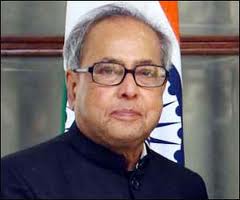 The President of India, Shri Pranab Mukherjee addressed the Conference of Vice Chancellors of Central Universities at Rashtrapati Bhavan today (February 5, 2013). Such a Conference is being held after a gap of nearly 10 years.
The President of India, Shri Pranab Mukherjee addressed the Conference of Vice Chancellors of Central Universities at Rashtrapati Bhavan today (February 5, 2013). Such a Conference is being held after a gap of nearly 10 years.
Speaking on the occasion the President said that a university is a seat of learning “which recognizes no frontiers except those of human mind itself”. It is the custodian of culture and a channel of communication with the world outside, he said. He further stated that Universities should not only provide knowledge and skills but also inculcate values of humanity and virtue.
The President said that besides being a powerful tool for the realisation of the nation’s technological and economic advancement, higher education has to fulfil the aspirations of the youth, who are restless and are looking for directions. The dearth of key talent for important academic and research positions in important institutions of higher education is a major challenge, he added. He also emphasised that another daunting challenge is the regulatory architecture and quality of governance. Therefore, the focus now has to be on policy formulation that promotes autonomy and good governance, he said. The President stressed that the flight of intellectual capital has to be discouraged by addressing service conditions of faculty and offering them incentives to serve the institutions within the country for longer periods.
Addressing the Conference, the President stated that the participation of private sector should be encouraged by formulating appropriate policies without compromising on the social objectives and the quality benchmarks. The Central Universities must act as a catalyst in taking forward this policy and make India a knowledge economy, he said. He also stated that the Universities have to act more proactively to improve the quality of faculty and they should build a directory of grass root level innovators.
The President said we are witnessing declining standards in the quality of higher education in our country. The National Knowledge Commission in its Report to the Nation, in 2006, referred to it as a “quiet crisis that runs deep”. We have to reverse this trend and for that collective wisdom is needed. He stated that access to knowledge is fundamental to our bid to empower our people. Though India has the second largest higher education system, the gross enrolment in the country in 2010 was only around 19% which is much below the world average of 29%. The enrolment of the disadvantaged sections is a matter of great concern, he said. For example, for scheduled tribe population the gross enrolment ratio in higher education is only half of the national average, he added.
The President emphasized that the simple fact is that much more needs to be done. We have to focus on quality of education imparted and the availability of opportunity to aspirants, to pursue higher education near the place of their residence, he said.
Addressing the Conference, the Prime Minister of India, Dr. Manmohan Singh stated that since the time the last Conference was held in 2003, the educational landscape had changed immensely. He said that fostering excellence in our higher educational institutions is a critical challenge that we must collectively address. He said that Central Universities are expected to become role models and an important role was envisaged for them.
Union HRD Minister, Dr. MM Pallam Raju stressed on mandatory accreditation of Universities which would set a quality bench mark. He said that the way forward was to inspire teachers and have a targeted approach on capacity building of the faculty.
Among the dignitaries present on the occasion were Dr. Sam Pitroda, Chairman, National Innovation Council, Dr. Shashi Tharoor and Shri Jitin Prasada, Ministers of State for HRD, Professor Ved Prakash, Chairman, UGC and also Vice Chancellors of 40 Central Universities.
